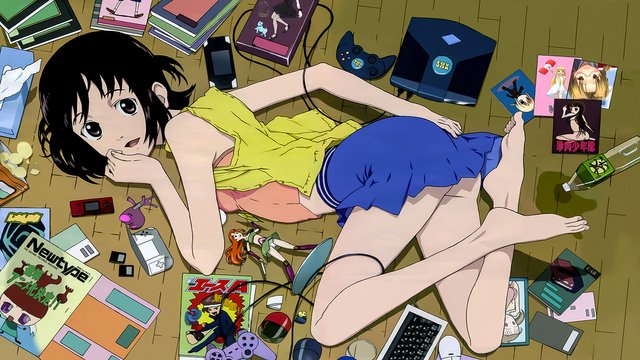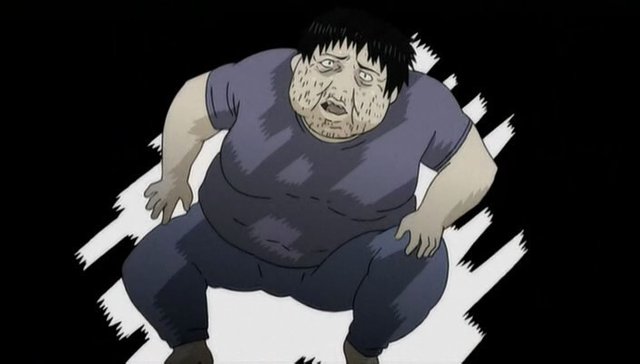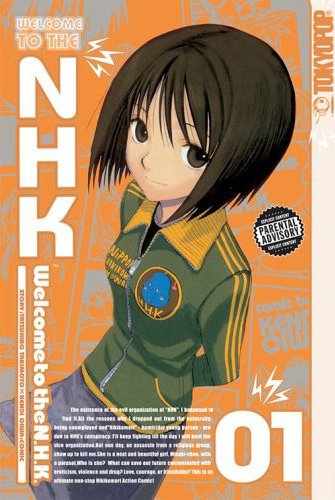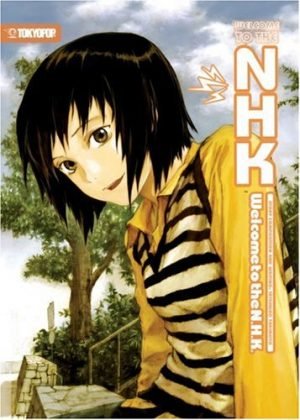Welcome to the NHK Manga, Anime and Light Novel Review, Comparison And The Importance of Execution
What has this?

Got to do with this?

Nothing.
The anime version of the story is the best.
The light novel is average.
The manga is atrocious.
The NHK anime has an unrealistic premise playing out in a plausible manner. The premise is the same as that many other anime and manga like Sundome, Oh my Goddess, Video Girl Ai and I think the first of its kind was a hentai OVA about a sucumbus coming out of a computer or something but I can't remember its name. It is a pretty flimsy uneralistic premise I must admit but the premise is not the show- it is the execution that matters. Welcome to the NHK was originally a light novel by Tatsuhiko Takimoto which was then subsequently adapted into two very different manga and anime adaptations. The premise of the show like in all those shows I have mentioned above is that of a beautiful girl coming to save some loser from himself and his own laziness and lack of initiative. What makes NHK better than all these other shows is that the angel like girl actually has a motive of her own for helping Satou, the protagonist of this show.
We are introduced to the protagonist in all three adaptations with a monologue by protagonist to the home appliances in his one room(8-tatami?) apartment about a conspiracy by the NHK(Japanese Broadcasting Corporation run by the government with TV license fees) to turn Japan's young men into otakus(geeks) by airing anime with cute girls. The conspiracy delusion aspects are poorly explored in all adaptations even though though they make a great way of introducing the main character Satou by showing how delusional he is even though it turns out he doesn't actually believe in the conspiracy himself. The conspiracy also plays a key part in the ending to the point that it kind of feels that the author forgot about the conspiracy but then found a neet way(get it?) to incorporate it in the ending. It was a really good opportunity lost but I admit that if it had done so then it would have bitten more than it can chew and would have had to abandon the otaku documentary.
The Anime
Despite at times feeling episodic by exploring too many negative aspects of otaku culture conseucutively in a short period of time, the anime version is the best version.
The ending, well what happens before and after the climax, is what feels the most plausible when the protagonist is forced by hunger to work in construction to earn a living because he wasted every other opportunity and when he settles into this new life and it isn't that devastating, that's when all the delusions and hopes melt in the air which makes it most satisfying. The protagonist's friend who lives next door, Yamazaki, also has a similar arc, and some very interesting lines too, also feels
In many ways NHK is the 'anti-dream' anime showing that what people and especially otakus really desire can't be achieved through success alone but through companionship of some kind. Satou was the happiest when he was fooling around with Yamazaki and Misaki(the main girl) and Satou's childhood friend and Yamazaki finally found peace when they got married(well in the anime and the light novel anyway). The characters in NHK are both funny and sad because it is funny when their outlandish schemes and dreams fail.
The animation of this show is not that good. Characters can sometimes be off model but fortunately this kind of show doesn't require that much animation as it's mostly characters sitting around occasionally being funny and perverted.
The Manga
In the manga they never show what happens after Satou decides to get a job in the creative industries while going back to live with his parents basically as a freelance writer selling his writing for nothing, like yours truly, so the ending feels hollow not hopeful.
The motives of the girl helping the guy are never explored and characters such as Yamazaki's girlfriend act just out of character. The girl especially feels too much like a plot device. The manga wastes too much time on the side stories when it can't afford to due to its length and then rushes the ending trying to end it on an artificially hopeful tone that is not convincing at all and makes you wonder what was the point of all this.
Thematically, the difference between the anime and the manga is that the manga implies but does not outright say that the problem is part of the solution while the anime doesn't see things this way at all. The light novel is neutral. The problem of course is anime and the culture around it. The anime is more convincing but the manga could have made a good case too had it not wasted too much time on melo-drama. Actually instead of a stand-alone story revisiting the events of the novel and anime it may have been better as a continuation of sorts.
The manga contradicts the 'anti-dream' message of the anime by having Satou end up being some sort of Shounen character striving towards something but it is never shown if this gets him anywhere or not or if this gets him what he wanted. The implied message of the anime is pretty much that what people need is relationships and that lofty dreams that are often undefined (Yamazaki and Satou wanted to be sucessful at anything, they didn't even know what they wanted) don't lead anywhere to get people what they want. The few who are able to live off of their hobbies shoud not be imitated according to the anime, as Yamazaki asks Satou 'Do you really want that kind of life-style?' When Satou tried to make a living by playing video games. The image conjured up in Satou's mind(which is the second image at the top) of a thirty year old himself who has spent all his time trying to make a living by playing vidya but has failed. The manga simply fails to provide a counter argument to this view even though that is what it attempts to do by having the protagonist try to get a job by working at home or something. I am not saying it could not be done. Heck, that is what I am trying to do as well, but the reality is not presented as it is as the manga ends on a suspiciously positive note. If I try to put in another way it's just like sports manga always end up being propaganda for the sport presenting it as the best thing ever without ever making the protagonists the losing side.
The Light Novel
The Light Novel does not suffer from the many problems that the manga suffers, like the characters especially the girl being constantly re-written but it suffers from the opposite that the anime does, it feels one-note, a lot of arcs and in the anime. One thing that the light novel had which the anime did not have is that the main character was actually taking drugs so him being delusional sometimes was excused while in the anime it kind of came out of nowhere.
Actually only the main character gets any proper characterization mainly through his internal monologues. Well, it is a light novel. The girl doesn't get any proper characterization and her motives just make sense but that's the anime too.
The light novel, unfortunately, didn't have any illustrations other than the book cover. I like the illustrations in light novels, sue me. The light novel ends on a similar note to the anime but failed to leave an impression on me as the characters seemed like ghosts in the main character's mind without having a presence in the actual world. Actually I wouldn't have been surprised if I had gotten a 'this was all a dream' pretentious ending.
Final thoughts and Scores
I honestly can't think of how to improve the anime other than improving the animation. The manga just wasted too much time and then ended too abruptly and the one-shot light novel was too short to fully explore the concepts. What I am going to say next is probably going to enrage people who watched this show but I think that a sequel could be done to this show. I know, I know, why spoil a perfect ending? Well, I would like to see the protagonist improving himself. It would be a boring slice of life series though, so I guess it's not a good idea. I am a sucker for character development and romance. I mean I am sure I can find plenty of romance fan fiction but that isn't what I want. The otaku aspects still need to come in here and there and it must all be plausible not like the manga which does in fact read like fan fiction.
I give this anime an 8/10
The manga is a 4/10
And the Light Novel is 5/10
Recommendations:
Genshiken: It's about a bunch of otakus in a university club exploring different aspects of otaku culture. It's a slice of life(nothing happens) so it's not my cup of tea but it's a good intro into otaku culture for normies and unexperienced otaku which doesn't romanticize its content or drown itself in self-deprecating humour to deflect legitimate criticism(as otaku often do).
Otaku no video: A part mock-documentary and part unrealistic empowerement fantasy of some dude creating an anime studio. Otaku no video(and to a lesser extent the first season of Genshiken) hasn't aged that well as otaku culture has changed, for example we don't have that many that many millitary otaku around and the mecha genre has all but dissappeared and few people keep let alone build robot figurines. Anime has become more mainstream. So it may not serve as a good introduction into otaku culture nonetheless it is a time capsule of otaku culture back in the 90s and 80s but let's be honest that was never the intention of otaku no video, it's intention was a bunch otakus poking fun at otaku's for their lack of social skills and for their fantastic, childish and often perverted self-empowerement fantasies and I think it still succeeds at doing that.
Evangelion: The other famous anti-escapist anime. I don't know. Is it just me or is it hypocritical to use anime and novels which are escapism to preach anti-escapism? Shouldn't an anit-escapist message necessarily be anti-anime and anti-fictin?I know you might say that I am putting the cart before the horse, after all it is not the fault of anime and manga that otaku end up antitsocial losers, it is the fault of otaku and geeks that they end up however they do and blaming it on anime is in fact putting the blame on someone else for one's own faults but..but...but (wags index finger) would it be really honest to say that anime and manga and novels and vidya for that matter don't contribute to this?

Manga Vol 1 Cover

Book Cover
Where in the manga does he say that he is living with his parents at the end
I think that the manga showed misaki's motives better than the anime
In the last arc Satou moves back with his parents and tries to make a living by working at home with a computer. Misaki says that all that she said to Satou about her situation was a lie and it is never made clear what her background was other than she trolled Satou.
If there was a sequal it would how sato relapsed into a hikkikomori because the author did the same
Exactly this is why the hopeful ending of the manga is so unconvincing.